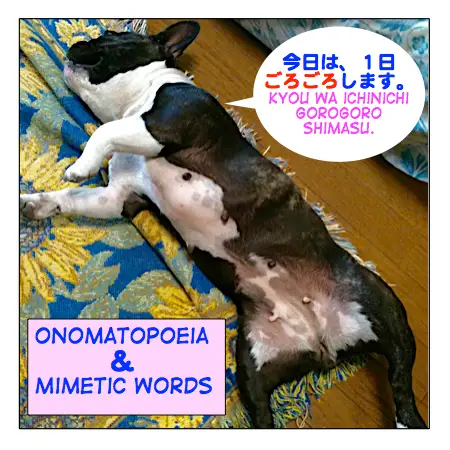
「今日は1日ごろごろします。」
= Kyou wa ichinichi gorogoro shimasu.
= I am going to lie around doing nothing today.
Hi everyone!
Today we are going to learn onomatopoeia. Yes, finally!
So many people asked me to make a lesson in the past and I tried to avoid making one because there are countless of onomatopoeia.
I will focus on the ones with repetitive sound like きょろきょろ= kyorokyoro (kyoro x 2 ) There are more than 200 words here but I won’t be able to cover all of them.
* 擬音語 = ぎおんご = giongo = onomatopoeia = based on sound
* 擬態語 = ぎたいご = gitaigo = mimetic words = describing movement/action/state
Technically you are supposed to write 擬音語 ( = ぎおんご = giongo) onomatopoeia in katakana and 擬態語 ( = ぎたいご = gitaigo ) mimetic words in hiragana
* 彼はがりがりだ。
= Kare wa garigari da.
= He is skinny.
(がりがり= garigari = describe a skinny person.)
* がりがり勉強する
= Garigari benkyou suru.
= to study like crazy
(がりがり= garigari = describe the way you study a lot)
* アイスキャンディーをガリガリ食べる。
= Aisukyandii wo garigari taberu.
= to crunch a popsicle.
(ガリガリ= garigari = crunching sound)
but I will type them in both hiragana and katakana because you will see them written both ways.
You may see the similar words with the same translation.
For example ぷくぷく ( = pukupuku) and ぶくぶく ( = bukubuku).
Basically when there are two dots 「 ゛」
Ex. がぎぐげご( = ba bi bu be bo) ・ざじずぜぞ ( = za ji zu ze zo) ・ばびぶべぼ ( = ba bi bu be bo), it sounds stronger or has a slightly negative nuance and many of the words which start with ぱぴぷぺぽ ( = pa pi pu pe po) sound cuter.
So if you see a chubby baby, you can say ぷくぷく ( = pukupuku) but if you say ぶくぶく( = bukubuku) to an adult, you may offend that person. For the same reason, ぷよぷよ ( puyopuyo) sounds cuter than ぶよぶよ( = buyobuyo) .
カタカタ ( = katakata) is a clattering sound. ガタガタ ( = gatagata) describes louder clattering sound.
The windows are clattering.
1) 窓がカタカタ鳴っている。 = mado ga katakata natteiru.
2) 窓がガタガタ鳴っている。 = mado ga gatagata natteiru.
We can assume the wind is stronger with ガタガタ ( = gatagata) than カタカタ ( = katakata).
When you emphasize a movement you sometimes add a little っ/ッ ( = tsu)
ぴかぴか / ピカピカ ( = pikapika) →ぴっかぴか/ピッカピカ ( = pikkapika) in casual writing/conversation.
Some of these words have a few different meanings. I marked these words with an asterix * if they have different usages.
★How to use:
The way you use onomatopoeia/mimetic words are slightly different depending on whether they are used as adjectives/adverbs or verbs.
1) ~の ( = no) + noun
2) ~した ( = shita) + noun
3) ~する ( = suru)
4) (Subject + が ( = ga)・は ( = wa) ) + 〜 + verb
5) (Subject + が ( = ga)・は ( = wa)) ~と + verb
6) (Subject + が ( = ga)・は ( = wa) ) ~だ・です ( = da/ desu)
7) (Subject + が ( = ga)・は ( = wa)) ~している ( = shiteiru)
8) (conversational) Subject + ~
9) (onomatopoeia) + (verb) 音がする ( = oto ga suru) + (verb) oto ga suru
(onomatopoeia) + ( と( = to)) 鳴っている ( = natte iru) / いっている ( = itte iru)
10) (Subject + が ( = ga)・は ( = wa)) ~になる ( = ni naru)
11) others
⬇️
1) ぐちゃぐちゃの髪の毛
= Guchagucha no kami no ke
= messy hair
2) ごちゃごちゃした部屋
= gochagocha shita heya
= cluttered room
3) いらいらする
= iraira suru
= to feel irritated
4) ビールをゴクゴク飲む。
= biiru wo gokugoku nomu
= to gulp down some beer
5) よろよろと歩く
= Yoroyoro to aruku
= to walk unsteadily, to totter
6) 肌がかさかさだ。
= Hada ga kasakasa da.
= My skin is so dry
7) 胸がきゅんきゅんする。
= Mune ga kyunkyun suru.
= My heart is thumping.
8) お腹ぺこぺこ
= Onaka pekopeko
= I’m hungry!
9) 火がパチパチ燃える音がする
= Hi ga pachipachi moeru oto ga suru.
= I hear a crackling fire sound.
10) 1日働いたらくたくたになった。
= Ichinichi hataraitara kutakuta ni natta.
= I got exhausted after working all day long.
***
You use them to describe people, things, weather, situations, etc. — basically anything. They often sound “cutesy” but you can use them to describe serious situations as well.
You may be surprised by how useful they are. You can even use them at the doctors to express your symptoms. I’ve put these words into categories, so hopefully they’ll make it easier for you to focus on what you want to learn first.
🌸 (⬅︎Since it is a long lesson, I put the flower marks here and there to jump back here.)
List of usage:
(1) one’s figure / physical appearance
(2) the textures/appearance of one’s hair
(3) the textures of one’s skin
(5) emotions/ feelings/attitude
(6) motions/situation/attitude/behavior
(9) talking/speaking/communicating with others
****
(15) the texture of food/drink
(16) cooking sounds/to describe how one cook
(17) how things look/move/smell/feel
******
OK, now that you see the list, please note that I will not give you examples for every word, but if you have any questions, feel free to ask in the comment section below.
(1) to describe one’s figure/ physical appearance
* がりがり/ ガリガリ(*) = garigari = skinny
* くりくり/クリクリ (*) = kurikuri = describe round eyes
Ex. あの子は目がくりくりしている。
= Anoko wa me ga kurikuri shite iru.
= He/She/That child has round eyes.
* ばきばき/バキバキ = bakibaki = muscular/six-pack
Ex. 見て、彼、バキバキだね。
= Mite, kare, bakibaki dane.
= Check out his six-pack!
* ひょろひょろ/ヒョロヒョロ = hyorohyoro = tall and skinny
* ぷくぷく/プクプク = pukupuku = chubby in a cute way
* ぶくぶく/ブクブク = bukubuku = fat (negative)
Ex. 最近、ぶくぶく太ってきた。
= Saikin, bukubuku futotte kita.
= I have been getting fat lately.
* ぷよぷよ/ プヨプヨ (*) = puyopuyo = flabby in a cute way
* ぷにゅぷにゅ = punyupunyu= (casual) flabby in a cute way (more conversational)
* ぶよぶよ/ ブヨブヨ(*) = buyobuyo = flabby
* むきむき/ムキムキ = mukimuki = muscular
Ex. 体を鍛えてむきむきになりたい。
= Karada wo kitaete mukimuki ni naritai.
= I would like to work out and get muscular.

🌸 (→Click the flower to go back to the list)
(2) to describe the textures/appearance of one’s hair
*くしゃくしゃ/クシャクシャ(*) = kushakusha = messy
*ぐしゃぐしゃ/クシャクシャ = gushagusha = messy (messier than くしゃくしゃ= kushakusha)
* くちゃくちゃ/クチャクチャ(*) = kuchakucha = messy
* ぐちゃぐちゃ/グチャグチャ = guchagucha = messy
(It sounds stronger than くちゃくちゃ( = kushakusha)・くしゃくしゃ(kushakusha))
* くるくる/クルクル = kurukuru /くりくり/クリクリ= kurikuri = curly
Ex. 髪の毛くりくりだね。
= Kaminoke kurikuri dane.
= Your hair is curly.
* さらさら/ サラサラ = sarasara = smooth and silky
* ちりちり/チリチリ = chirichiri = frizzy
Ex. パーマで髪がちりちりになっちゃった。(casual)
= Paama de kami ga chirichiri ni nacchatta.
= My got permed and my hair got too frizzy.
* つやつや/ツヤツヤ = tsuyatsuya = shiny/glossy
* ふさふさ/ フサフサ = fusafusa = bushy/full head of hair/abundant hair
Ex. 祖父は年のわりに髪の毛がふさふさしている。
= Sofu wa toshi no wari ni kami no ke ga fusafusa shiteiru.
= My grandfather has a lot of hair for his age.
* ぼさぼさ/ボサボサ = bosabosa = messy hair
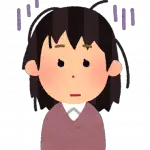
* ぼうぼう/ボウボウ or ぼーぼー/ボーボー = boubou = messy hair, growing hair in a messy way. (You can also use it to describe overgrown weeds)
* もじゃもじゃ/モジャモジャ= mojamoja = shaggy, bushy (hair, beard, eyebrows)
Ex. ヒゲがもじゃもじゃになってきたからもう剃ったら?
= Hige ga mojamoja ni natte kita kara mou sottara?
= Your beard is getting bushy. Isn’t it about time for a shave?
🌸 (→Click the flower to go back to the list)
(3) to describe the textures of one’s skin
* ざらざら/ザラザラ = zarazara = sandy, rough feeling
* すべすべ / スベスベ = subesube = smooth
* かさかさ/カサカサ = kasakasa = dry and rough
* がさがさ/ガサガサ = gasagasa = dry and rough
(drier and more rough than かさかさ = kasakasa)
Ex. 踵ががさがさだ。
= Kakato ga gasagasa da.
= (The skin on) my heels are really dry.
* ぎとぎと/ギトギト = gitogito = greasy
* つるつる/ツルツル = tsurutsuru = smooth /glossy
Ex. エステに行ったら肌がつるつるになった。
= Esute ni ittara hada ga tsurutsuru ni natta.
= I had a facial and my skin got so smooth.
* てかてか/テカテカ = tekateka = greasy/oily
Ex. 顔がてかてかしている。
= Kao ga tekateka shiteiru.
= One’s face gets oily.
* べとべと/ベトベト = betobeto = sticky, greasy
🌸 (→Click the flower to go back to the list)
(4) to describe one’s physical condition/pain
* からから/ カラカラ = karakara = thirsty, dried out
Ex. 喉がからからだ。
= nodo ga karakara da.
= I’m thirsty.
* がんがん/ガンガン= gangan = a loud sound, splitting ache.
Ex. 頭ががんがんする
= atama ga gangan suru
= I have a splitting headache.
* きりきり / キリキリ= kirikiri = sharp pain
Ex. 胃がきりきり痛む
= i ga kirikiri itamu.
= I have a sharp stomachache.
* きんきん/キンキン(*)= kinkin = sharp pain/ringing in the ear/hearing high-pitched noise.
Ex. 耳がキンキンする。
= Mimi ga kinkin suru.
= My ears are ringing.
* ぐうぐう/グウグウ or ぐーぐー/ グーグー(*) = guuguu = hungry, one’ stomach is growling
Ex. お腹がグーグー鳴っている。
= Onaka ga guuguu natte iru.
= one’s stomach is growling. (being hungry)
* くたくた/ クタクタ = kutakuta = tired, exhausted
* こちこち / コチコチ = kochikochi = stiff, tight
Ex. 肩がこちこちだ。
= Kata ga kochikochi da.
= My shoulders are so tight.
* ごろごろ/ゴロゴロ(*) = gorogoro = one’s stomach is grumbling loudly (when you have a diarrhea)
Ex. お腹がゴロゴロいっている。
= Onaka ga gorogoro itteiru.
= My stomach is grumbling loudly.

* じんじん / ジンジン = jinjin = stinging pain, feeling numb, tingling
* ずきずき / ズキズキ = zukizuki = a throbbing pain in the head
* ぴちぴち/ ピチピチ = pichipichi = young and full of life
* ひりひり/ヒリヒリ = hirihiri = stinging pain (Ex. sunburn)
Ex. 日焼けで背中がひりひりする。
= Hiyake de senaka ga hirihiri suru.
= My back has a stinging pain for sunburn
* よぼよぼ/ ヨボヨボ = yoboyobo = decrepit (describes how old people walk or move unsteadily)
*ぴんぴん/ ピンピン = pinpin = alive and kicking, full of life, fit as a fiddle
Ex. うちのおじいちゃは95歳だがまだぴんぴんしている。
= Uchi no ojiichan wa kyuujuugosai daga mada pinpin shite iru.
= My grandpa is 90 years old, but he is alive and kicking.

*ぶつぶつ/ブツブツ (*) = butsubutsu = little spots, pimples
Ex. 顔にぶつぶつができた。
= Kao ni butsubutsu ga dekita.
= I got spots on my face.
*ふらふら/フラフラ(*) = furafura = dizzy
Ex. 朝からなにも食べていないのでふらふらする。
= Asa kara nanimo tabete inai node furafura suru.
= I feel dizzy because I haven’t had anything to eat since this morning.
* へとへと/ ヘトヘト= hetoheto = exhausted
Ex. 1日働いてへとへとだ。
= Ichinichi hataraite hetoheto da.
= I am exhausted from working all day.
* ぺこぺこ / ペコペコ = pekopeko = hungry
Ex. お腹がぺこぺこです。
= Onaka ga pekopeko desu.
= I’m hungry.
- むかむか/ムカムカ(*) = mukamuka = queasy
Ex. 胃がむかむかする。
= i ga mukamuka suru.
= I feel sick to my stomach.
* よろよろ/ ヨロヨロ= yoroyoro = tottering, wobbling
🌸 (→Click the flower to go back to the list)
(5) to describe one’s emotions/ feelings/attitude
* いらいら/イライラ = iraira = irritating, irritated, ticked off
Ex. 彼の顔を見るだけでいらいらする。
= Kare no kao wo miru dake de irairasuru.
= Just looking at his face irritates me.
* かりかり/カリカリ(*) = karikari = edgily, touchily,
* かんかん/カンカン = kankan = furious
* がみがみ/ガミガミ = gamigami = nagging
Ex. お母さん、そんなにガミガミ言わないで。
= Okaasan sonnani gamigami iwanai de.
= Mom, stop nagging me like that.
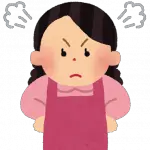
* きびきび / キビキビ = kibikibi = moving briskly, to do things smoothly/energetically
Ex. 彼女はいつもきびきび働いている。
= Kanojo wa itsumo kibikibi hataraite iru.
= She is always working briskly.
* きゅんきゅん/キュンキュン (*) = kyunkyun = heart throbbing
Ex. この曲を聞いていると胸がきゅんきゅんする。
= Kono kyoku wo kiite iru to mune ga kyunkyun suru.
= When I listened to this music, I got this tingling sensation in my chest.
* しぶしぶ / シブシブ = shibushibu = doing something reluctantly
Ex. 会議にしぶしぶ出席する。
= Kaigi ni shibushibu shusseki suru.
= to attend a meeting reluctantly.
* そわそわ / ソワソワ = sowasowa = being restless
Ex. 明日から旅行に行くのでいまからそわそわする。
= Ashita kara ryokou ni Iku node ima kara sowasowa suru.
= I am going on a vacation tomorrow and I feel restless.
* ちゃらちゃら / チャラチャラ = charachara = to describe a person (especially a man) who is shallow, frivolous, superficial
* つんつん/ ツンツン(*) = tsuntsun = being cold, unfriendly
* でれでれ/デレデレ = deredere = flirtatious, mushy, overly affectionate
Note: The slang word ツンデレ ( = tsundere) describes a woman who is cold at the beginning but gets flirtatious with time.
* どきどき/ドキドキ = dokidoki = being nervous/excited / heartbeat sound
Ex. 明日のデートのことを考えただけでドキドキする。
= Ashita no deeto no koto wo kangaeta dake de dokidoki suru.
= Just thinking about the date for tomorrow makes me feel nervous.

*のびのび/ノビノビ = nobinobi = feeling relaxed, freely
Ex. 今日はうるさい上司がいないのでのびのびできる。
= Kyou wa urusai joushi ga inai node nobinobi dekiru.
= My annoying boss is not in today, so I can relax.
* はらはら/ハラハラ = harahara = feeling uneasy/ anxious
Ex. はらはらして試合を観ていたが勝ててよかった。
= Harahara shite shiai wo mite ita ga katete yokatta.
= I watched the game nervously, but I am happy that they won the game.
* ぴりぴり/ピリピリ = piripiri = feeling uptight, edgy
Ex. なんか、今日ぴりぴりしてるね。大丈夫?(casual)
= Nanka, kyou piripiri shiteru ne. Daijoubu?
= You seem a little edgy today. Are you okay?
* ぷんぷん/ プンプン(*)= punpun = being angry
Ex. 「デート中、携帯でゲームしていたら彼女がぷんぷん怒ってさあ…」(casual)
= 「Deeto chuu keitai de geemu shiteitara kanojo ga punpun okottete saa.」
= “My girlfriend got pissed off because I was playing a game on my cellphone while on our date…”
* へらへら/ヘラヘラ= herahera = frivolous
* ぽろぽろ/ポロポロ = poroporo = tears pouring down
Ex. 彼のことを考えるだけで涙がぽろぽろ出てくる。
= Kare no koto wo kangaeru dake de namida ga poroporo dete kuru.
= Just thinking about him makes me tear up.
* ぼろぼろ/ボロボロ (*) = boroboro = tears pouring down
* むかむか/ ムカムカ(*) = mukamuka = queasy, angry
Ex. ああ、むかむかするから一言いってやりたい。
= Aah, mukamuka suru kara hitokoto itte yaritai.
= Ugh, I got so pissed off. I want to give him a piece of my mind.
* むずむず/ムズムズ = muzumuzu = itchy/have an itch for something/to have a strong desire to do something/being impatient
Ex. ずっと病気で家にいたから出かけたくてむずむずしている。
= Zutto byouki de ie ni ita kara dekaketakute muzumuzu shiteiru.
= I have been staying home sick so I can’t wait to go out.
* めそめそ/メソメソ = mesomeso = weeping (negative)
Ex. 留学したての頃はホームシックでめそめそ泣いていた。
= Ryuugaku shitate no koro wa hoomushikku de mesomeso naite ita.
= I used to weep with homesickness when I just started studying abroad.
* もじもじ / モジモジ = mojimoji = being shy, hesitantly, fidgeting
Ex. もじもじしていないでもっと自分の意見をはっきり言いなさい。
= Mojimoji shite inai de motto jibun no iken wo hakkiri iinasai.
= Don’t be shy and state your opinion clearly.
*わくわく/ワクワク = wakuwaku = to get excited
Ex. コンサートのことを考えただけでわくわくする。
= Konsaato no koto wo kangaeta dake de wakuwaku suru.
= Just thinking about the concert makes me feel excited.
* わんわん/ワンワン = wanwan = to cry loudly, to wail
Or how we bark (Bow Wow! ) 🐶
For animal sounds, check this lesson 動物 ( = どうぶつ = doubutsu = Animal Related Japanese)
🌸 (→Click the flower to go back to the list)
(6) to describe one’s motions/situation/attitude/behavior
* うろうろ/ ウロウロ = urouro = hanging around, wandering around
Ex. 一人で夜の街をうろうろしていると危ないんじゃない? (casual)
= Hitori de yoru no machi wo urouro shiteiru to abunain janai?
= Isn’t it dangerous to hang around in the town at night by yourself?
* がりがり/ガリガリ(*) = garigari = to study like crazy (negative)
(ガリ勉 = gariben = abbreviation of がりがり勉強する( = garigari benkyou suru) to cram)
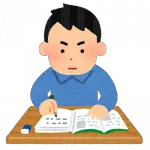
*がんがん/ ガンガン = gangan = vigorously/ to talk to someone in a pushy manner/ to do something crazy non-stop.
Ex. あまりがんがん誘うと女の子はひいちゃうよ。(casual/slang)
= Amari gangan sasou to onnano ko wa hiichau yo.
= If you are too pushy asking girls out, they will turn them down, you know.
* ぐいぐい/グイグイ= guigui = being pushy, to push without hesitation
Ex. 彼は、ぐいぐい来すぎる。
= Kare wa, guigui kisugiru.
= He is coming on too strong/too pushy
* ぐずぐず / グズグズ = guzuguzu = procrastinating, lingering, taking too much time to do something
Ex. ぐずぐずしているとバスに乗り遅れるよ。
= Guzuguzu shite iru to basu ni noriokureru yo.
= Hurry up! (Don’t dawdle!) You are going to miss the bus.
* くねくね/ クネクネ = kunekune = wiggling / zigzag
Ex. 彼は体をくねくねして踊る。🕺
= Kare wa karada wo kunekune shite odoru.
= He wiggles his body when he dances.
* くるくる / クルクル (*)= kurukuru = spinning/ turning round and round
Ex. 尻尾を追いかけてくるくる回る犬
= Shippo wo oikakete kurukuru mawaru inu
= A dog who spins chasing its tail
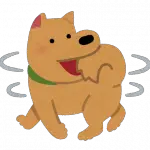
* ぐるぐる / グルグル(*) = guruguru = spinning/ turning round and round
Ex. ロープでぐるぐる巻きにする
= Roopu de guruguru maki ni suru
= to wind something up with a rope
* くんくん /クンクン = kunkun = sniffing
Ex. マギーは靴の臭いをくんくん嗅いでいた。
= Maggie wa kutsu no nioi wo kunkun kaide ita.
= Maggie sniffed the shoe(s).
* こそこそ/ コソコソ = kosokoso = sneakily/secretly (negative)
Ex.こそこそしないで正直に思っていることを言ってほしい。
= Kosokoso shinai de shoujiki ni omotte iru koto wo itte hoshii.
= Stop sneaking around and tell me what you honestly think.
* ごそごそ/ ゴソゴソ = gosogoso = to rummage around ~ making noise
*こつこつ/コツコツ = kotsukotsu = diligently, steadily
Ex. 毎日、こつこつ勉強する。
= Mainichi, kotsukotsu benkyou suru.
= to study diligently every day.
Ex. こつこつ貯金する。
= Kotsukotsu chokin suru.
= to save money little by little/steadily
* ごろごろ/ゴロゴロ (*) = gorogoro = being lazy, and doing nothing (lying down)
From the picture above:
「今日は1日ごろごろします。」
= Kyou wa ichinichi gorogoro shimasu.
= I am going to lie around doing nothing today.
* だらだら / ダラダラ = daradara = being lazy and doing nothing
Ex. 日曜日はだらだら過ごす。
= Nichiyoubi wa daradara sugosu.
= I just relax doing nothing at home on Sundays.
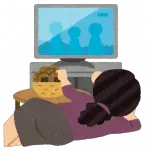
Note: You can replace it with ごろごろ( = gorogoro). The nuance difference is だらだら ( = daradara) is just being lazy and doing nothing. ごろごろ ( = gorogoro) implies doing nothing lying down. (Like me in the picture above)
* のろのろ/ ノロノロ = noronoro = to move slowly
Ex. のろのろ運転
= noronoro unten
= driving slowly
* ぱくぱく / パクパク(*) = pakupaku = opening and closing one’s mouth repeatedly
* ばたばた/ バタバタ (*) = batabata = being busy/being busy taking care of some problems/ running around in a busy way/ struggling
Ex. 今週はばたばたしているから来週にしない?
= Konshuu wa batabata shite iru kara raishuu ni shinai?
= I am swamped this week. How about next week?
* ぱたぱた/ パタパタ (*) = patapata = pitter-patter
* ぶらぶら/ ブラブラ = burabura =hang around/ doing nothing without a job
Ex. ちょっとこの辺をぶらぶらしてきます。
= Chotto kono hen wo burabura shitekimasu.
= I will hang around here.
* ふらふら/フラフラ (*) = furafura = hang around without any specific purpose
🌸 (→Click the flower to go back to the list)
(7) to describe one’s relationships
* いちゃいちゃ/イチャイチャ = ichaicha = 1) flirting, 2) making out
Ex. 映画館で彼といちゃいちゃしてるの見ちゃったよ。(casual)
= Eigakan de kare to ichaicha shiteru no michatta yo.
= I saw you were making out with your boyfriend in the movie theater.
* ぎすぎす/ギスギス = gisugisu = to describe some awkward situation/relationships.
Ex. ぎすぎすした関係
= Gisugisu shita kankei.
= An awkward relationship
* ばちばち/バチバチ = bachibachi = to be on bad terms with each other, fighting
Ex. 母と妹がばちばち喧嘩している。
= Haha to imouto ga bachibachi kenka shiteiru.
= My mom and little sister are fighting like cats and dogs.
* めろめろ/ メロメロ = meromero = madly in love with someone
Ex. 彼は彼女にめろめろだ。
= Kare wa kanojo ni meromero da.
= He is madly in love with her.
* もてもて / モテモテ = motemote = being popular with girls/boys, being attractive
Ex. マギー、もてもてだね。
= Maggie, motemote dane.
= You are very popular with boys, Maggie.
🌸 (→Click the flower to go back to the list)
(8) to describe the way one smiles/laughs 😆
* くすくす / クスクス = kusukusu = giggling
Ex. 彼のジョークに女の子達はクスクス笑っていた。
= Kare no jooku ni onnanokotachi wa kusukusu waratteita.
= Girls were giggling at his joke.
* けらけら/ケラケラ= kerakera = laughing in a cackling manner
* げらげら/ゲラゲラ = geragera = laughing out loud (louder than ケラケラ= kerakera)
Ex. 妻はお笑い番組を見てゲラゲラ笑っている。
= Tsuma wa owarai bangumi wo mite geragera waratte iru.
= My wife was cracking up so hard watching a comedy show.
* にこにこ/ニコニコ = nikoniko = smiling (positive)
Ex. 彼女はいつもにこにこ笑って感じがいい。
= Kanojo wa itsumo nikoniko waratte kanji ga ii.
= She is a pleasant person and is always smiling.
* にたにた / ニタニタ = nitanita = grinning/smirking
* にやにや/ニヤニヤ = niyaniya = grinning/smirking (*similar to にたにた= nitanita)
Ex. 何にやにや笑ってるの?
= Nani niyaniya waratteru no?
= What are you smirking at?

* へらへら/ヘラヘラ = herahera = to laugh foolishly
🌸 (→Click the flower to go back to the list)
(9) to describe how one talks/speaks/communicates with others
* きゃあきゃあ/ キャアキャア(きゃーきゃー/キャーキャー)= kyakyaa
= screaming in high voice(girls/children) for joy, for fear
Ex. 彼はどこに行ってもファンにキャーキャー騒がれる。
= Kare wa doko ni ittemo fan ni onna no ko ni kyaakyaa sawagareru.
= Wherever he goes, he gets screaming fans.
* ぎゃあぎゃあ / ギャアギャア = gyaagyaa = screaming, being noisy/ complaining in a loud way
(louder than キャアキャア・キャーキャー( = kyaakyaa)
* ずけずけ/ ズケズケ= zukezuke = outspoken
Ex. あの人はなんでもずけずけ言うから苦手だ。
= Ano hito wa nandemo zukezuke iu kara nigate da.
= I don’t like him/her because he/she says whatever comes to mind.
* すらすら/ スラスラ = surasura = to answer/read/read say things smoothly, fluently
Ex. よくそんな嘘がすらすら出てくるね。
= Yoku sonna uso ga surasura dete kuru ne.
= How dare you to lie through your teeth like that!
* ねちねち / ネチネチ = nechinechi = nagging, insistent, sticky
Ex. もう終わったことだからねちねち言わないで。
= Mou owatta koto dakara nechinechi iwanai de.
= That was a long time ago. Stop nagging.
* はきはき / ハキハキ = hakihaki = briskly, to speak clearly.
* ぶつぶつ / ブツブツ= butsubutsu = mumbling, grumbling to oneself
Ex. ブツブツ文句ばかり言っていないで手伝って。
= Butsubutsu monku bakari itte inai de tetsudatte.
= Stop grumbling to yourself and help me.
* ぶうぶう/ブウブウ or ぶーぶー/ブーブー = buubu = complaining
Ex. 宿題を出したら生徒にブーブー文句を言われた。
= Shukudai wo dashitara seito ni buubuu monku wo iwareta.
= I gave my students homework, and they all complained
* べらべら/ ベラベラ = berabera = chattering, blah-blah
Ex. 彼女は、人の秘密をベラベラしゃべるから気をつけた方がいいよ。
= Kanojo wa, hito no himitsu wo berabera shaberu kara ki wo tsuketa hou ga ii yo.
= Be careful with her. She tells other people’s secrets.
* ぺらぺら/ ペラペラ = perapera = chattering, to speak language fluently
Ex. マギーは犬語がぺらぺらだ。
= Maggie wa inugo ga perapera da.
= Maggie speaks dog language fluently.
* ぼそぼそ/ ボソボソ = bosoboso = to speak in a mumble, talking in a whispering voice
Ex. あの先生はいつもボソボソ話すからよく聞こえない。
= Ano sensei wa itsumo bosoboso hanasu kara yoku kikoenai.
= That teacher always mumbles, so it is hard to hear what he/she is saying.
* わいわい/ ワイワイ = waiwai = making a noise (in a fun way) / having a blast in a group
Ex. またみんなでわいわいしたいね。
= Mata minna de waiwai shitaine.
= I’d love to have a blast with everybody again.
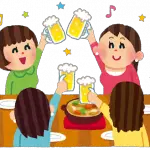
🌸 (→Click the flower to go back to the list)
(10) to describe how one walks/steps
* かつかつ/ カツカツ = katsukatsu = walking in heels 👠
* つかつか/ ツカツカ= tsukatsuka = walking up to someone without hesitation
Ex. 知らない人がツカツカ近づいてきて「マギー先生ですか?」と話しかけてきた。
= Shiranai hito ga tsukatsuka chikazuite kite “Maggie sensei desu ka?” to hanashikakete kita.
= A stranger walked up to me without hesitation and talked to me, “Are you Maggie Sensei?”
* ぞろぞろ / ゾロゾロ = zorozoro = moving(going/coming in/walking) in a crowd
Ex. 建物の中から人々がぞろぞろ出てきた。
= Tatemono no naka kara hitobito ga zorozoro dete kita
= Lots of people are coming out of the building one after the other.
* ちょろちょろ/チョロチョロ = chorochoro = water is coming out a little constantly/ when someone (especially a little child or small animal) moves around restlessly.
* てくてく/ テクテク= tekuteku = walking a long distance
Ex. バスがこなかったからてくてく歩いてきたよ。(casual)
= Basu ga konakatta kara tekuteku aruite kita yo.
= The bus didn’t come, so I walked all the way.
* とことこ /トコトコ = tokotoko = toddling / running with short steps (a small child/baby)
Ex. その子はとことこお母さんのところへ歩いていった。
= Sono ko wa tokotoko okaasan no tokoro e aruite itta.
= The child toddled towards his/her mother.
* どしんどしん/ドシンドシン(*) = doshindoshin = walking with heavy steps
* とぼとぼ/ トボトボ = tobotobo = walking in a lonely way, walking wearily
Ex. 暗がりをとぼとぼ歩いて家に帰った。
= Kuragari wo tobotobo aruite ie ni kaetta.
= I walked home in the dark. (in a lonely way/feeling depressed)
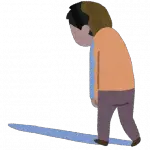
* ぱたぱた / パタパタ (*) = patapata = walking with slippers in a noisy way.
* よちよち/ ヨチヨチ = yochiyochi = toddling around (It is used for a baby)
🌸 (→Click the flower to go back to the list)
(11) to describe how one eats/drinks
* がつがつ/ ガツガツ= gatsugatsu = eating a large amount of food fast, gobbling food hungrily
Ex. 朝から何も食べていなかったからガツガツ食べた。
= Asa kara nanimo tabete inakatta kara gatsugatsu tabeta.
= Since I didn’t have anything from the morning, I gobbled the food.
* かりかり/ カリカリ(*) = karikari = nibbling sound
* がりがり/ ガリガリ = garigari = crunching sound
Ex. ねずみがガリガリ壁を噛む音がする。
= Nezumi ga garigari kabe wo kamu oto ga suru.
= I hear a mouse chewing on the wall.
* くちゃくちゃ/ クチャクチャ = kuchakucha = chewing sound
Ex. 気持ちが悪いからクチャクチャ音を立てて食べるのをやめて。
= Kimochi ga warui kara kuchakucha oto wo tatete taberu no wo yamete.
= It’s disgusting. Stop making the loud chewing sound when you eat.
* ぐびぐび/ グビグビ = gubigubi = gulping alcohol / taking quick gulps
Ex. ビールをグビグビ 飲む。
= Biiru wo gubugubi nomu.
= to gulp down a beer.
* ごくごく/ ゴクゴク = gokugoku = gulping sound
Ex. 息子は喉が渇いていたのか水をゴクゴク飲んでいた。
= Musuko wa nodo ga kawaite ita no ka mizu wo gokugoku nonde ita.
= I guess my son was thirsty because he drank water in big gulps.
That is one thing that dogs can’t do because we don’t have a long neck.
* ずるずる/ ズルズル = zuruzuru = sound of slurping noodles (in a noisy way)
Ex. ラーメンをズルズルすするのは「ヌーハラ」って言うんだって。(casual)
= Raamen wo zuruzuru susuru no wa “Nuuhara” tte iun datte.
= I heard slurping ramen noodles is called “Nu-hara” ( = Noodle harassment)
* ちゅうちゅう / チュウチュウ or ちゅーちゅー/ チューチュー = chuuchuu = sound of sucking up a drink through a straw.
* つるつる/ ツルツル (*) = tsurutsuru = sound of slurping noodle smoothly
* むしゃむしゃ/ ムシャムシャ = mushamusha = chomping on
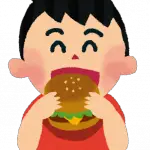
* もぐもぐ / モグモグ= mogumogu = chewing food with one’s mouth closed
Ex. もぐもぐタイム = mogumogu taimu (slang) = snack (nom-nom) time.
A buzz word from the 2018 Winter Olympics. Japan Women’s Curling Team had a snack during the break and people started to call the snack time, もぐもぐタイム (= mogumogu taimu )
* ぱくぱく / パクパク(*) = pakupaku = gobbling(Opening and closing one’s mouth repeatedly)
Ex. うちの犬はなんでもパクパク食べる。
= Uchi no inu wa nandemo pakupaku taberu.
= My dog munches anything.
* ぺろぺろ/ ペロペロ pero pero = licking sound, licking something constantly.
Ex. 犬に顔をぺろぺろ舐められた。
= Inu ni kao wo peropero namerareta.
= I got my face licked by a dog. (passive form)
= My dog licked my face.
* ぼりぼり/ ボリボリ(*) = boribori = munching, crunching
Ex. あられをボリボリ食べる。
= Arare wo boribori taberu.
= to crunch rice crackers
* ぽりぽり/ ポリポリ(*) = poripori = munching, crunching (louder than ポリポリ= poripori)
🌸 (→Click the flower to go back to the list)
(12) to describe how one sleeps
* うとうと/ウトウト = utouto = dozing off
Ex. 電車の中でうとうとした。
= Densha no naka de utouto shita.
= I was dozing off on the train.
* ぐうぐう/グウグウ or ぐーぐー/グーグー(*) = guuguu = sound asleep /zzz…
Ex. お父さんはまだグーグー寝ています。
= Otousan wa mada guuguu nete imasu.
= My dad is still sound asleep.
* すやすや/スヤスヤ= suyasuya = sound peacefully
Ex. 赤ちゃんはすやすや眠っていた。
= Akachan wa suyasuya nemutte ita.
= The baby was sleeping peacefully.
🌸 (→Click the flower to go back to the list)
(13) to describe how one sees/watches/looks
* きょろきょろ/ キョロキョロ= kyorokyoro = looking around restlessly
Ex. あたりをきょろきょろ見回してハチ公の銅像を探した。
= Atari wo kyorokyoro mimawashite Hachikuo no douzou wo sagashita.
= I looked around restlessly to find the Hachikou statue (the famous dog statue in Shibuya in Tokyo)
* じろじろ/ジロジロ = jirojiro = staring at someone/something (in a rude manner)
Ex. じろじろ見ないでください。
= Jirojiro minai de kudasai.
= Don’t stare at me.
* ちらちら/ チラチラ = chirachira = glancing at someone/something
Ex. あの人、さっきからこっちをちらちら見てるよ。知ってる人かな?(casual)
= Ano hito, sakki kara kocchi wo chirachira miteru yo. Shitteru hito kana?
= He/She/That person keeps glancing at us. Do we know him/her?
🌸 (→Click the flower to go back to the list)
* かんかん/カンカン(*) = kankan = blazing sun
Ex. 今日はかんかん照りだ。
= Kyou wa kankan deri da.
= It’s scorching hot today.
*ぎらぎら/ ギラギラ = giragira = glaring sun
Ex. 太陽がぎらぎらしている。
= Taiyou ga giragira shite iru.
= The sun is glaring.
* ごろごろ/ゴロゴロ (*) = gorogoro = rumbling thunder
Ex. 雷がゴロゴロ鳴っている。
= Kaminari ga gorogoro natte iru.
= The thunder is rambling.
* ざあざあ/ザアザア =zaazaa = pouring rain
Ex. 外はざあざあ降りだ。
= Soto wa zaazaa buri da.
= It is pouring outside.
* しとしと/シトシト = shito shito = drizzling, raining quietly
Ex. 雨がしとしと降っている。
= Ame ga shitoshito futte iru.
= It is drizzling.
*じめじめ/ジメジメ= jimejime = humid
Ex. 梅雨の季節はじめじめしている。
= Tsuyu no kisetsu wa jimejime shiteiru.
= It’s humid in the rainy season.
*しんしん/シンシン= shinshin = to snow in silent ❄️
Ex. 雪がシンシン降っている。
= Yuki ga shinshin futte iru.
= It is snowing quietly.
* そよそよ = soyosoyo = to describe nice breeze, to breeze gently/softly
Ex. 風がそよそよ吹く。
= Kaze ga soyosoyo fuku.
= There is a nice and gentle breeze.
* むしむし/ムシムシ = mushi mushi = humid, muggy
Ex. 今日はむしむしするね。
= Kyou wa mushimushi surune.
= It’s humid today, isn’t it?
* ぱらぱら/ パラパラ = parapara = sprinkling rain
Ex. 雨がぱらぱら降ってきた。
= Ame ga parapara futte kita.
= It has started to sprinkle.
* ぴかぴか/ピカピカ (*)= pikapika = lightening ⚡️
Ex. 稲妻がぴかぴか光った。
= Inazuma ga pikapika hikatta.
= Lightening flashed.
* ぴゅうぴゅう/ピュウピュウ or ぴゅーぴゅー/ ピューピュー = pyuu pyuu = howling wind
Ex. 風がピューピュー吹いている。
= Kaze ga pyuupyuu fuite iru.
= The wind is howling.
* びゅうびゅう/ビュウビュウ or びゅーびゅー/ ビュービュー = byuu byuu
= howling wind (stronger than ピュウピュウ( = pyuu pyuu) )
* ぽかぽか/ ポカポカ= pokapoka = nice and warm weather
Ex. 今日はぽかぽか陽気だ。
= Kyou wa pokapoka youki da.
= It’s nice and warm today.
🌸 (→Click the flower to go back to the list)
(15) to describe the texture of food/drink
* かちかち/ カチカチ = kachikachi = something hard
Ex. お餅がかちかちになった。
= Omochi ga kachikachi ni natta.
= The rice cake got harder.
* きんきん/ キンキン = kinkin = very cold, ice-cold (drink)
Ex. きんきんに冷えたビール
= kinkin ni hieta biiru.
= ice-cold beer
* さくさく / サクサク= sakusaku = soft and crispy
Ex. このクッキー、さくさくだね。
= Kono kukkii, sakusaku dane.
= This cookie is nice and crispy.
* ざらざら/ザラザラ = zarazara = feeling rough
* しゅわしゅわ/ シュワシュワ = shuwa shuwa = Sound of bubble/describe fizziness, bubbly
* つるつる/ツルツル(*) = tsuru tsuru = sound of slurping noodles /slippery/smooth surface
Ex. つるつるのうどん
= Tsurutsuru no udon
= smooth udon-noodle
* とろとろ/ トロトロ = torotoro = describe something smooth/creamy, runny
(or とろーり/トローリ = toroori )
* どばどば/ドバドバ = dobadoba (casual)
= pouring some liquid generously, pouring out in large amounts
Ex. マヨラーは何にでもマヨネーズをどばどばかける。
= “Mayoraa” wa nan ni demo mayoneizu wo dobadoba kakeru.
=“Mayoler” ( mayo lovers) pour out a large amount of mayo on anything.

* ねばねば / ネバネバ = nebaneba = gooey, sticky, stringy
Ex. 納豆はねばねばした食べ物です。
= Nattou wa nebaneba shita tabemono desu.
= Natto (fermented soybeans) is a sticky/stringy food.
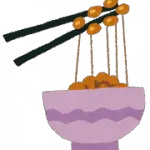
* ぱさぱさ / パサパサ = pasapasa = dry
Ex. スポンジケーキがパサパサしている。
= Suponjikeeki ga pasapasa shiteiru.
= The sponge cake is dried out.
* ぱりぱり/ パリパリ = paripari = sound of eating crispy/crunchy food
* ふわふわ/ フワフワ = fuwafuwa = soft / fluffy
Ex. ふわふわのケーキ
= Fuwafuwa no keeki
= fluffy cake
* ぷるんぷるん/ プルンプルン = purunpurun = wobbly, shaky, describing something jelly-like
Ex. 見て、このゼリー、ぷるんぷるん!
= Mite, kono zerii, purunpurun!
= Look at this jelly. It’s nice and wobbly.
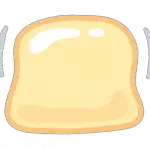
* べとべと/ ベトベト = beto beto = describe something sticky
* ほかほか / ホカホカ= hokahoka = nice and warm (food)
Ex. ほかほか弁当
= hokahoka bentou
= hot/nice and warm boxed lunch
* もちもち / モチモチ = mochimochi = chewy (positive)
* べたべた/ベタベタ = betabeta = sticky, greasy
🌸 (→Click the flower to go back to the list)
(16) Cooking sound/describing how one cooks
* ことこと/コトコト= kotokoto = simmering over low heat (to simmer something for a long time)
Ex. カレーをことこと煮る。
= Karee wo kotokoto niru.
= to simmer curry sauce
* じゅうじゅう/ジュウジュウ or じゅーじゅー/ ジュージュー= juujuu = sizzling sound
Ex. 肉をジュージュー焼く匂いがしてきた。
= Niku wo juujuu yaku nioi ga shite kita.
= I smell sizzling meat.
* ぐつぐつ/グツグツ = gutsugutsu = simmering sound
Ex. シチューをぐつぐつ2時間煮込んでください。
= Shichuu wo gutsugutsu nijikan nikon de kudasai.
= Simmer the stew for two hours.
🌸 (→Click the flower to go back to the list)
(17) to describe how things look/move /smell/feel
* がらがら/ ガラガラ (*) = (some space/transportation is) nearly empty
Ex. 日曜日はバスががらがらだ。
= Nichiyoubi wa basu ga garagara da.
= The bus is (nearly) empty on Sundays./There are very few people on the bus on Sundays.
* ぎゅうぎゅう/ギュウギュウ or ぎゅーぎゅー/ ギューギュー= gyuugyuu = packed
Ex. ぎゅうぎゅう電車の通勤はストレスがたまる。
= Gyuugyuu densha no tsuukin wa sutoresu ga tamaru.
= I get stressed out commuting when the train is packed.
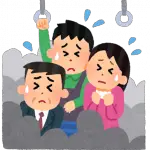
* きらきら/ キラキラ = kirakira = shining/glittering
Ex. きらきらした目
= kirakira shita me
= sparkling eyes.
* くしゃくしゃ/クシャクシャ(*) = kushakusha = wrinkled
Ex. シーツがくしゃくしゃになってしまった。
= Shiitsu ga kushakusha ni natte shimatta.
= The bed sheet got wrinkled.
* くちゃくちゃ/クチャクチャ(*) = kuchakucha = messy, wrinkled
* ぐちゃぐちゃ/グチャグチャ(*) = guchagucha = messy, wrinkled, slushy
Ex. 今、部屋の中がぐちゃぐちゃだから来ないで。(casual)
= Ima, heya no naka ga guchagucha dakara konai de.
= My room is messy right now. Don’t come over.
* ごちゃごちゃ/ゴチャゴチャ = gochagocha = messy, cluttered, mixed up
Ex. スペイン語とポルトガル語を同時に勉強し始めたら頭の中がごちゃごちゃになってきた
= Supeingo to porutogarugo wo douji ni benkyou shihajimetara atama no naka ga gochagocha ni natte kita.
= I’ve started to study Spanish and Portuguese at the same time, and I got them mixed up in my head.
* ごみごみ / ゴミゴミ= gomigomi = crowded, cluttered, to be in disorder, chaotic, jumbled
Ex. 東京の街はごみごみしている。
= Toukyou no machi wa gomigomi shite iru.
= The city of Tokyo is all jumbled up.
* だぶだぶ/ダブダブ = dabudabu = buggy, clothes are too loose
→Note: (You also say だぼだぼ/ダボダボ = dabodabo)
Ex. 痩せてパンツがだぶだぶだ。
= Yasete pantsu ga dabudabu da.
= I lost weight and my pants are too big.
* ばらばら/バラバラ = barabara = coming apart, falling apart, breaking up
Ex. コンピューターをばらばらにしたら元に戻せなくなった。
= Konpyuutaa wo barabara ni shitara moto ni modosenaku natta.
= I took the computer apart, but I couldn’t put it back together.
* ぴかぴか/ ピカピカ (*)= pikapika = shiny, spick and span
Ex. 床をぴかぴかに磨く
= Yuka wo pikapika ni migaku.
= to polish up the floor.
Many Japanese people associate this word with this expression from a TV commercial.
Ex. ぴかぴかの一年生
= Pikapika no ichinensei
= A shiny first grader.
*びしょびしょ/ビショビショ = bishobisho = soaking wet
Ex. 雨でびしょびしょになった。
= Ame de bishobisho ni natta.
= I got soaking wet in the rain.
* ひらひら/ヒラヒラ= hirahira = fluttering (flower petals or some thin items falling)
Ex. 桜の花びらがひらひらと舞う
= Sakura no hanabira ga hirahira to mau.
= Cherry blossom petals are fluttering. (The literal meaning is “dance around”)
* びりびり/ビリビリ= biribiri 1) ripping/tearing up some paper/cloth 2) getting an electric shock
Ex. 手紙をビリビリ破る。
= Tegami wo biribiri yaburu.
= to rip up a letter.
* ぷかぷか / プカプカ = pukapuka = floating on the water / puffing a cigar
* ぷんぷん/ プンプン(*) = punpun = strong smell
Ex. この部屋は香水の匂いがぷんぷんする。
= Kono heya wa kousui no nioi ga punpun suru.
= The smell of perfume in this room is strong.
* ぺらぺら/ペラペラ(*) = perapera = to describe something thin
Ex. この本はぺらぺらだから1時間で読めるよ。(casual)
= Kono hon wa perapera dakara ichijikan de yomeru yo.
= This book is so thin, that I can finish reading in an hour.
* ぽたぽた/ポタポタ = potapota = dripping
Ex. 天井から水がぽたぽた落ちている。
= Tenjou kara mizu ga potapota ochite iru.
= Water is dripping from the ceiling.
* ぼたぼた/ボタボタ = botabota = dripping
* ぼろぼろ/ ボロボロ = boroboro = shabby, crumbling
Ex. 兄は、ぼろぼろの服を着ていても平気だ。
= Ani wa, boroboro no fuku wo kite ite mo heiki da.
= My big brother doesn’t mind wearing shabby clothes.
* もくもく / モクモク= mokumoku = smoking
Ex. 煙突から煙がもくもく出ている。
= Entotsu kara kemuri ga mokumoku dete iru.
= The smoke is rising up from the chimney.
* もこもこ / モコモコ = mokomoko = describe fluffy fur/animal /sweater, etc.
* ゆらゆら / ユラユラ = yurayura = to sway slowly
Ex. ろうそくの火がゆらゆら揺れていた。🕯
= Rousoku no hi ga yurayura yurete ita.
= The candle flame flickered.
🌸 (→Click the flower to go back to the list)
(18) to describe some change / growth
* ぐんぐん/グングン = gungun = (to progress) steadily, rapidly, significantly
Ex. マギー先生のサイトで勉強すると日本語がぐんぐん伸びます。
= Maggie sensei no saito de benkyou suruto nihongo ga gungun nobimasu.
= If you study with Maggie Sensei’s site, your Japanese will improve significantly.
* じわじわ/ジワジワ = jiwajiwa = gradually, something affects you slowly, a little by little
Ex. 彼の言葉がじわじわ心に響いてきた。
= Kare no kotoba ga jiwajiwa kokoro ni hibiite kita.
= His words have touched my heart gradually.
* すくすく/スクスク= sukusuku = to grow quickly (in a healthy manner)
Ex. 子供達はすくすく育っています。
= Kodomotachi wa sukusuku sodatte imasu.
= (Literally: Children are raised up so quickly.) Children grow up so fast.
* どんどん/ドンドン = dondon = more and more, significantly, rapidly, steadily
Ex. どんどん食べて。
= Dondon tabete.
= Eat more! / Eat! Eat!! Eat!!
🌸 (→Click the flower to go back to the list)
* かたかた / カタカタ = katakata = clatter
Ex. 地震で食器棚の皿がカタカタ鳴った。
= Jishin de shokkidana no sara ga katakata natta.
= The dishes in the cupboard clattered due to the earthquake.
* がらがら/ガラガラ(*) = garagara = rattling sound
* がちゃがちゃ/ガチャガチャ= gachagacha = clatter (stronger)
The name of a machine from which you buy little toys in a capsule is from this sound.
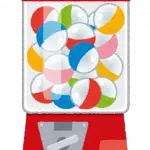
* ぎしぎし/ギシギシ = gishigishi = creaking/squeaking sound
Ex. 床がギシギシいう。
= Yuka ga gishigishi iu.
= The floor squeaks.
* きいきい/キイキイ or きーきー/キーキー = kiikii = squeaking
* くちゃくちゃ/クチャクチャ(*) = kuchakucha = chewing something noisily.
* こんこん/ コンコン = konkon = coughing sound, sound of knocking
Ex. 一晩中、コンコン咳が出た。
= Hitobanjuu, konkon seki ga deta.
= I was coughing all night long.
*ごほごほ/ゴホホゴ = gohogoho = stronger cough
* ざわざわ/ザワザワ = zawazawa = the sound that a crowd makes/feeling uneasy
* じゃあじゃあ/ジャアジャア or じゃーじゃー/ジャージャー = jaajaa
Ex. 水がジャージャー漏れていた。
= Mizu ga jaajaa morete ita.
= The water was leaking a lot.
* じょきじょき/ ジョキジョキ = jokijoki = snipping with scissors
* ちょきちょき/ チョキチョキ = chokichoki =snipping with scissors
Ex. はさみでチョキチョキ切る。
= Hasami de chokichoki kiru.
= to cut something with scissors
* とんとん /トントン = tonton = knocking/tapping sound/ tapping someone’s shoulders
Ex. ドアをトントンと叩く音で目が覚めた。
= Doa wo tonton to tataku oto de me ga sameta.
= I woke up from the tapping sound on the door.
* ばきばき/ バキバキ = bakibaki = cracking sound
Ex.ストレッチをすると肩がバキバキいう。
= Sutorecchi wo suru to kata ga bakibaki iu.
= When I do some stretching, my shoulders crack and pop.
* ぱしゃぱしゃ/パシャパシャ= pashapasha = shooting off pictures one after another
Ex. 写真をパシャパシャ撮る。
= Shashin wo pashapasha toru.
= to take pictures one after another.
* ぱちぱち/パチパチ= pachipachi = clapping hands / cracking fire
Ex. 手をパチパチ叩く。 👏
= Te wo pachipachi tataku.
= to clap one’s hands/ to applaud
* ぽきぽき/ポキポキ = pokipoki = snapping sound
Ex. 小枝をポキポキ折る。
= Koeda wo pokipoki oru.
= to snap a twig
* ぼきぼき/ボキボキ = bokiboki = cracking sound
* ぽたぽた/ポタポタ = potapota = dripping sound
Ex. 洗濯物から水がぽたぽたしたたっている。
= Sentakumono kara mizu ga potapota shitatatte iru.
= Water is dripping from the laundry
* ぽたんぽたん/ ポタンポタン = potan potan = dripping sound (slower than ぽたぽた ( = potapota)
* ぱたぱた / パタパタ (*) = patapata = flapping sound / fanning sound
Ex. 扇子でパタパタ扇ぐ。
= Sensu de patapata aogu.
= to fan briskly with a (folding) fan.
🌸 (→Click the flower to go back to the list)
**
 マギー先生より = Maggie Sensei yori = From Maggie Sensei
マギー先生より = Maggie Sensei yori = From Maggie Sensei
やっとこのレッスンを作ることができました。
= Yatto kono ressun wo tsukuru koto ga dekimashita.
= I finally made this lesson.
まだまだカバーしきれなかった言葉がいっぱいあると思いますが、アシスタントのゆかりがもうくたくただと言っているのでこのへんにしますね。
= Madamada kabaa shikirenakatta kotoba ga ippai aru to omoimasu ga, asisutanto no Yukari ga mou kutakuta dato itte iru node kono hen ni shite okimasune.
= There are so many more words that I wanted to cover but my assistant, Yukari is saying she is exhausted so we will stop here.
みんな、こつこつ勉強してね。
= Minna, kotsukotsu benkyou shitene.
= OK, everyone! Be diligent and study hard.
***
I REALLY appreciate your support! サポートありがとう! !CHECKHEART!
My supporters can access an audio file for this lesson on my Patreon page and some mini lessons and quizzes.
Audio File for this lesson
![]() Part 1 (introduction part) Click here.
Part 1 (introduction part) Click here.
![]() Part 2 (#1~#4) Click here.
Part 2 (#1~#4) Click here.
![]() Part 3 (#5~#6)Click here.
Part 3 (#5~#6)Click here.
![]() Part 4 (#7~#10) Click here.
Part 4 (#7~#10) Click here.
![]() Part 5 (#11~#19)Click here.
Part 5 (#11~#19)Click here.

15 Comments
Dear Aya
Thank you for your message. I sent you a personal message through Patreon. Please check your Direct Message on Patreon. 🙏
Sensei, happy new year!
I have a question about this sentence. 「彼、バキバキだね」. May I ask why was it written in Katakana? I thought it was 擬態語.
Have a good day!
Hi Shiratori
Happy New Year!!
OK, as I mentioned at the beginning of this lesson, you are supposed to write 擬態語 in hiragana but actually you see them both written in hiragana and katakana in modern Japanese.
You tend to write colloquial / relatively new 擬態語 in katakana. バキバキ is one of them.
thanks for your effort
My pleasure!
Many of the onomotopoeia and mimetic words that I do remember are due to familiarization through reading manga. But when I find these words in pure text I’m often left to guess their meaning.
I think I’ll draw the pictures to go along with these words to help me memorize them better. Thank you very much for this lesson!
My pleasure!!
Visualize the words with your drawing is a great idea!
I’m the absolute worst when it comes to remembering these (they all sound the same and their meanings sound unclear) so thanks a lot for making this beast of a lesson!
You are very welcome!
I hope you don’t “stay skeptic” now. (^_−)−☆
I have now added everything on this list to my anki, it along with other resources like onomatopedia helped a lot! Especially the ones with sample sentences. I’m finally not completely lost when people use these words. I even guessed the meaning of ”ボソリ” when reading something because it resembled ぼそぼそ I had learned and I had a whole buncha other り ending adverbs.
Good!! Once you learned some word, it will be easier to guess the meaning of similar words.
マギー先生、教えてくれてありがとうございます!あなたのポストについて日本語が役に立つよ!
JJ、私のレッスンが役に立つと聞いてとってもうれしいです!! U^ェ^U 💕
Thank you so much for making this lesson. I’ve been waiting for this one for a while! I’ve been on this journey for six years and still learning new things thanks to you!
I have a question about some of these words. You said at the beginning of the lesson that this lesson will only cover words that repeat, but is there a big difference between words like: ぐるぐる回る / ぐるっと回る and にこにこ笑う / にっこり笑う ?
Hello J,
Glad to hear that there is still something that you can learn from me. ☺️
ぐるぐる回る / ぐるっと回る
にこにこ笑う / にっこり笑う
They mean the same but ぐるぐる/にこにこ describe the state or movement more visually /graphically.